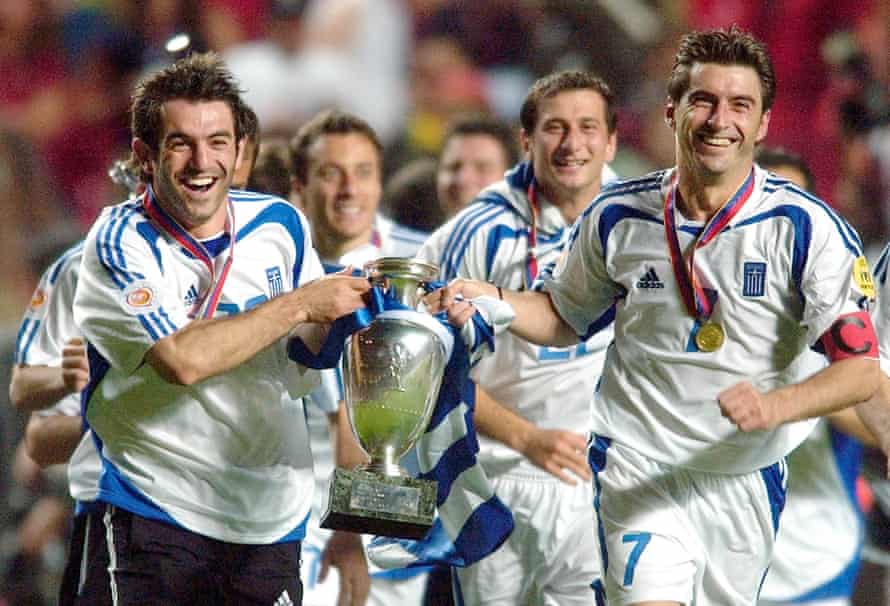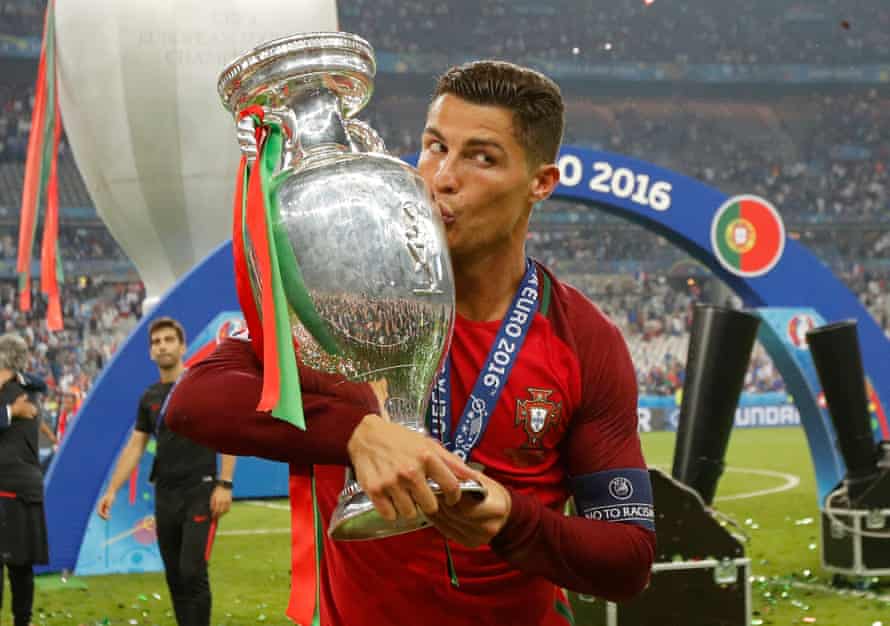It is sometimes said that national teams are no longer in keeping with the times. In fact, the concept of nation is historically burdened, especially in Europe. But it is not only a suitable form that organises our coexistence well. Nation also creates identification.
And so a competition of nations, a European Championship, strengthens the European idea. Through the playfulness of football, it can even serve international understanding in the broadest sense, because everyone acts according to the same rules and many people from many different regions participate, whether as players or fans.
The history of the European Championship, which was launched 30 years later than the World Cup due to Europe’s political conflicts, is proof of the unifying effect sport can have. The first tournament in 1960, in the midst of the cold war, was won by the Soviet Union. Lev Yashin, the “Black Panther” from Moscow, is still known to fans all over the world. He remains the only goalkeeper to win the Ballon d’Or. He is considered the prototype of the playmaking keeper.
In 1976 Czechoslovakia, another team from the eastern bloc, became European champions in Belgrade. In the course of qualifying and the tournament, they defeated England, Portugal and the two 1974 World Cup finalists, West Germany and the Netherlands. Antonin Panenka, who outwitted Sepp Maier with a lob in the penalty shootout in the final, became famous: chipped penalty kicks are named after their inventor from Prague.
Euro 96 in England, when Uefa’s membership had grown after the fall of the iron curtain, welcomed confident teams from the new nations of Croatia and the Czech Republic. In the mid-2000s, Uefa followed the European Union’s eastward expansion and awarded the 2012 Euros to Poland and Ukraine.
This time, for the first time, the tournament will be held in 11 countries. It will pass almost everywhere, including places where early football history was written. Glasgow was a birthplace of our game in the 19th century. Budapest, with Vienna, was the home of playful Danube football. The arena in the Hungarian capital is named after Ferenc Puskas, whom the French sports paper L’Équipe named Europe’s footballer of the century.
Paradoxically, the special charm of a European Championship comes from the fact that the tactical level is lower than in the club game. Quite simply that is because national coaches work less often with the players and can exert less influence. The phenomenon is also familiar in basketball and handball. In addition, the squads are not curated, they are not invested in, which is why they are more heterogeneous than club teams and some positions are not filled with specialists. You improvise and take what your country can offer.
As a result the competition at European Championships or World Cups becomes more diverse. Fifteen European Championships have so far produced 10 different winners. If a team find themselves in the course of the tournament they can go far, partly because there is no second leg. This gives the smaller teams a better chance.
The history of the European Championship includes some interesting stories. In 1988, the champions were the Netherlands. The Oranje won in West Germany and victory was celebrated in the small neighbouring country as a second liberation from the former occupiers. In 1992, Denmark won having only qualified after the expulsion of war-torn Yugoslavia. An even bigger sensation was the triumph of Greece in 2004 under the leadership of Otto Rehhagel. In 2016 Portugal, who have produced many good players and coaches but can rarely win titles due to their small population, held up the trophy. All these teams performed strongly as a unit.
At Euro 2016 in France, a small island with a population of only 350,000 inspired the crowds. Iceland developed an infectious group dynamic and team spirit. They knocked England out of the tournament a few days after the Brexit vote. Fans dressed as Vikings and trolls supported their team with the “Thunderclap”. Together with their community, the Icelandic players were able to move mountains and extinguish volcanoes. This was sport in the most primal sense. Most Icelanders will remember that summer for the rest of their lives.

Croatia reached the final at the 2018 World Cup. It is a relatively young nation, with a high proportion of its citizens living abroad. So debates about identity are something it needs to catch up on. The performances of its national team provide a good illustration of how it wants to be represented as a nation, as do those at the Eurovision song contest.
The Euros experience is reminiscent of Asterix books, in which stereotypes about the British, the Swiss and the Goths are played with. Of course, the sense of unity sometimes becomes too strong, and then it turns into prejudice against others. Yet it is the diversity of the people who are enthusiastic about football that makes a European Championship so special. And the beauty of football is that no one has to give up what they have become as a result of growing up and their environment. That being different is recognised.
National teams virtually promote the expression of cultural achievements. Thus, one always experiences teams in the style typical of their country. The Spaniards and Italians are most seriously influenced by their football culture and league. One always knows what one will get. They are also potential finalists this time. England, as usual, have a large collection of exciting talent. But because the stars of the Premier League usually come from elsewhere, the Three Lions often lack key players.
The attraction of such a tournament also lies in the fact you can observe the top stars you know from the big clubs in their national teams. How do they interpret their task, how do they pull their teammates along? Michel Platini, Europe’s best player in his time and star of Juventus, led France to the title in his homeland in 1984. He excelled in that tournament much like Diego Maradona did in the 1986 World Cup. Platini scored nine goals in five games – as a midfielder. Platini’s Équipe Tricolore with the Gallic rooster on its chest laid the foundation for France’s later successes.
In 2016 Gareth Bale, who played for Real Madrid, led Wales to the semi-finals. Cristiano Ronaldo also contributed for his small country. Portugal won the final against France, in the end without Ronaldo, who came off injured in that match. Afterwards, he cheered on the team from the coaching zone. You could watch him realise that he depends on and also benefits from the strength of his teammates. Winning the Euros made him complete as a football star.

This time pay special attention to Kevin De Bruyne (as long as he has fully recovered from his injury), who won titles this year with his overview and drive in the Manchester City jersey. Belgium have other strong footballers – Eden Hazard, Romelu Lukaku and Thibaut Courtois. This is a team you would like to see win as a fan. I am curious to see the 33-year-old Real Madrid striker Karim Benzema. France became world champions in 2018 and runners-up in 2016 without him. If Didier Deschamps wants to reach the final of a major tournament for the third time in a row, like Spain did from 2008 to 2012 and West Germany from 1972 to 1976, the French coach will have to integrate Benzema, a man of character, well.
In Germany, the nation with the best European Championship record, Joachim Löw wanted to initiate a shake-up two years ago. But he recently brought back two retired 2014 world champions, Thomas Müller and Mats Hummels. Now the crucial question is how that will affect the hierarchy. Löw must form a new pair of central defenders around Hummels, and Müller will also work his way into the team.
After the early exit from the 2018 World Cup, it will be important for Löw to make it clear to all players that playing for your country is a special responsibility. Money and contracts are less important than in everyday club life. The national team is about values like cooperation, friendship and home, all the things that are attributed to team sports. I’ve heard my anthem 113 times, and it’s always been a moving moment. You make history at the Euros or the World Cup.
I also like the fact that the field of participants has grown – from eight (starting in 1960), to 16 (1996), to 24 (2016). This year, the Finns are participating for the first time. They are not the favourites, just like Germany in ice hockey. They have to accept that. Being underdogs can be seen as a challenge in life.
The North Macedonians, who recently beat Germany 2-1, are also making their debut. The small, young republic has changed its name. It wants to join Nato and the EU, something it has so far been denied. Participation in the Euros will bring undeniable added value in their quest to find out who they are and who they want to be.
The Fiver: sign up and get our daily football email.
Covid-19 will, of course, affect this pan-European tournament. Dublin and Bilbao have unfortunately dropped out as hosts. This time, the main thing will be to protect themselves and to cope with the pandemic. This is still a task for the entire world. Nevertheless, this European Championship will hopefully also be a people’s festival, a free, peaceful competition of nations.
from Football | The Guardian https://ift.tt/3x5jSWi
via IFTTT

No Comment